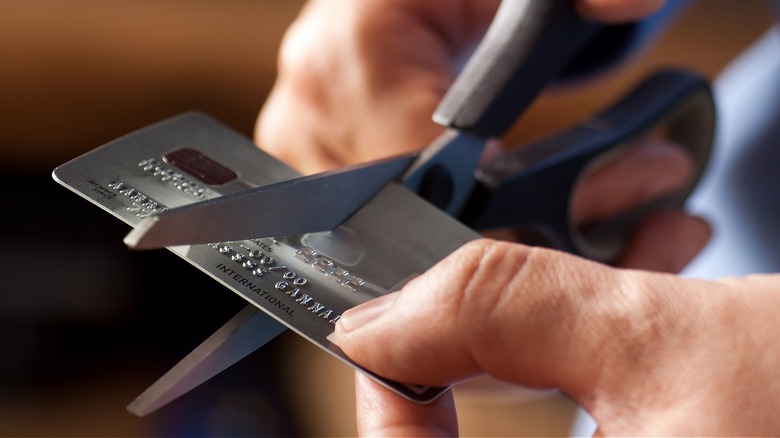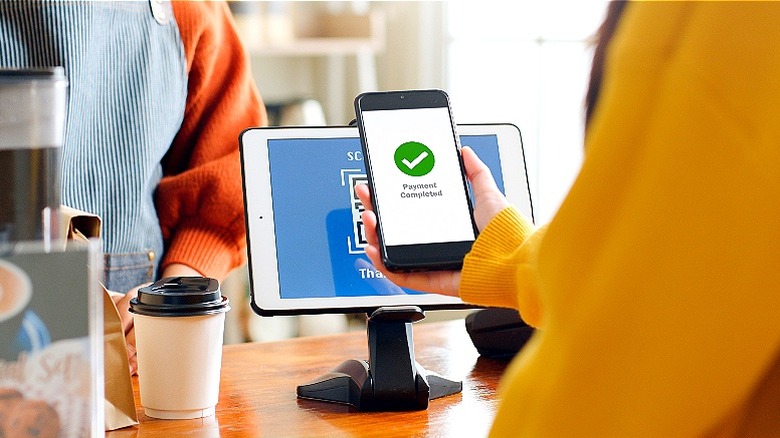Why Taking On This Extremely Aggressive Financial Challenge May Be Worth The Try
Although it's been around for a long time, the video-oriented social media platform TikTok recently brought new life to a financial challenge that's designed to turn the arduous process of saving money into something of a game. Per TikTok, the challenge is known as "No-Spend January," meaning that consumers refrain from any nonessential purchases for the entire first month of the year. As it turns out, January may be a fortuitous month to abstain from spending, because it's also "Dry January" for many American consumers who choose to give up alcohol for the month, perhaps following some winter holiday excesses.
During the no-spend period (the exact month to accept the challenge is up to you), consumers will still keep up with their necessities, like rent or mortgage payments, groceries, and utilities. However, splurges like restaurant meals, buying new clothes, coffee shops, and more are forbidden. On TikTok (by the way, here's how to make money on TikTok), "No-Spend January" obviously lasts one month, but you can tweak the time frame to better suit your lifestyle. It might be a good idea to start small, but some folks extend their no spending periods to cover an entire season or even an entire year. An alternate path to curb spending on nonessentials is to forbid that sort of activity on certain day(s) of the week in perpetuity.
A no-spend challenge can help with lifestyle creep
The money you save from not indulging splurges during the no-spend challenge can be used for a variety of purposes. For instance, your end goal might be to stash an appropriate amount of living expenses in an emergency fund, or perhaps you have the admirable mindset to pay off high-interest rate debt, like those credit card balances. Alternatively, saved funds from a no-spending challenge can go toward a dream vacation or making extra contributions toward your retirement accounts.
If you have a clear sense of purpose during the no-spend challenge, that's great but not entirely necessary. A more holistic view of the no-spend challenge is it develops permanent good-spending habits and better defines what's truly important to you in life. You might find that you don't even miss some of the things you were previously spending money on. In a phenomenon called "lifestyle creep," sometimes consumers will spend more money as their income increases without even realizing it. Fortunately, a no-spend month can reveal if you've perhaps fallen into this trap.
Don't go crazy once the spending fast ends
Obviously, the no-spend challenge is temporary because eventually, even the most thrifty types will need new clothing, up-to-date electronics, or the occasional restaurant or happy-hour treat to remain social. In fact, a modest splurge can even serve as a reward at the end of a no-spend challenge. While that might seem counterproductive, one small treat to congratulate positive behavior is a proverbial drop in the bucket versus the savings of an entire month of abstaining from non-necessities.
On the other hand, you'll want to beware prolonged increased spending once the challenge is over. That is, you might find yourself "revenge spending" to make up for lost time during the no-spending period. And just like so many who break their New Year's resolutions, many challenge-takers might break their budgeting pledge before their no-spend month is over. As such, some personal finance experts recommend cutting out potentially wasteful spending in moderation rather than going "cold turkey." For example, eliminating just one item to start (like the pricey everyday visit to the coffee shop, the metaphor used in the latte effect).
Unfortunately, there may be no perfect, easy hack to establishing healthy savings habits, no matter how viral these concepts become on TikTok. However, taking on a financial fast can be a step in the right direction. You could be surprised with a permanent shift in spending habits, a sense of what's truly important in life, and being content with still-functional items you already own.


